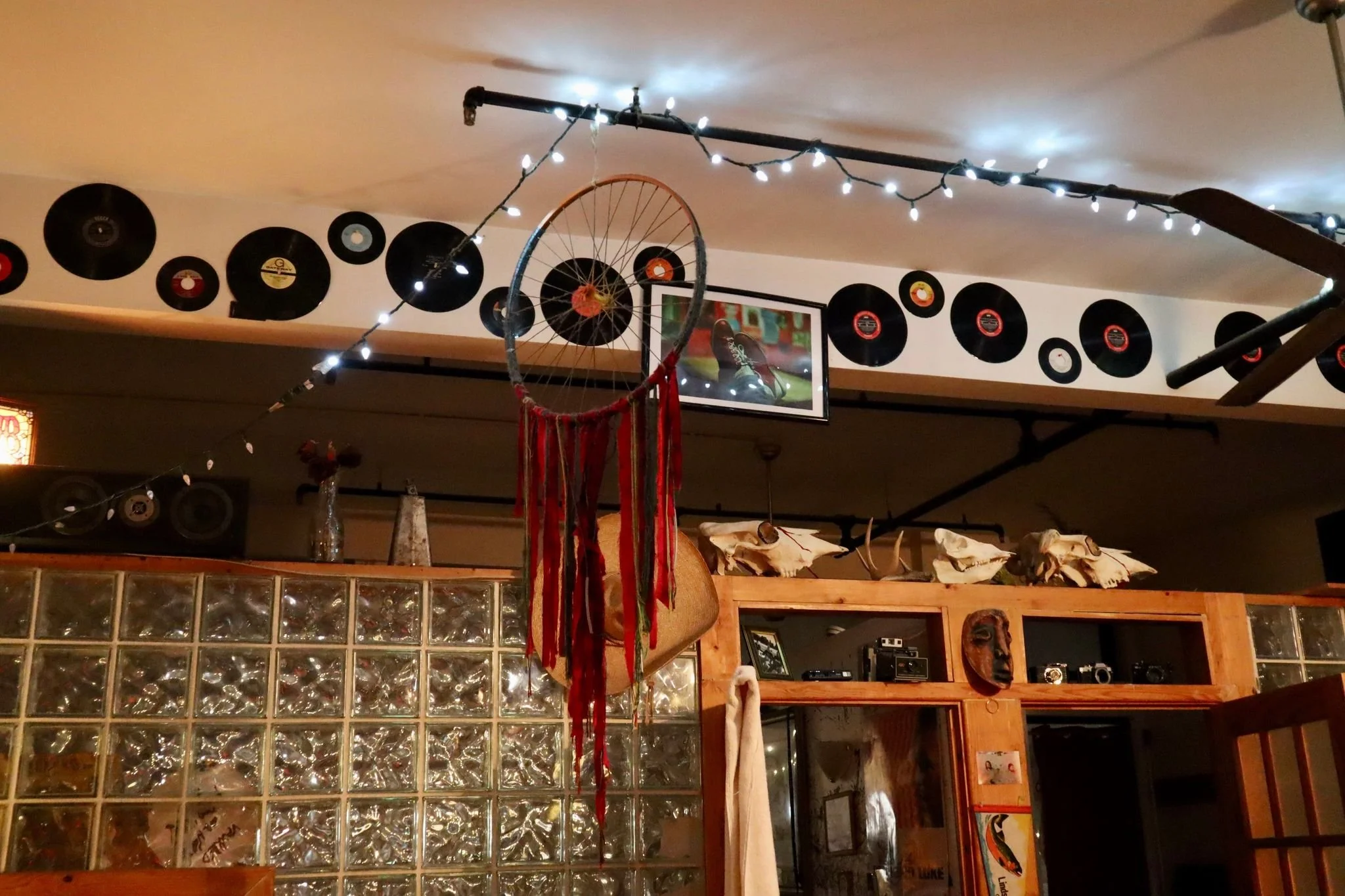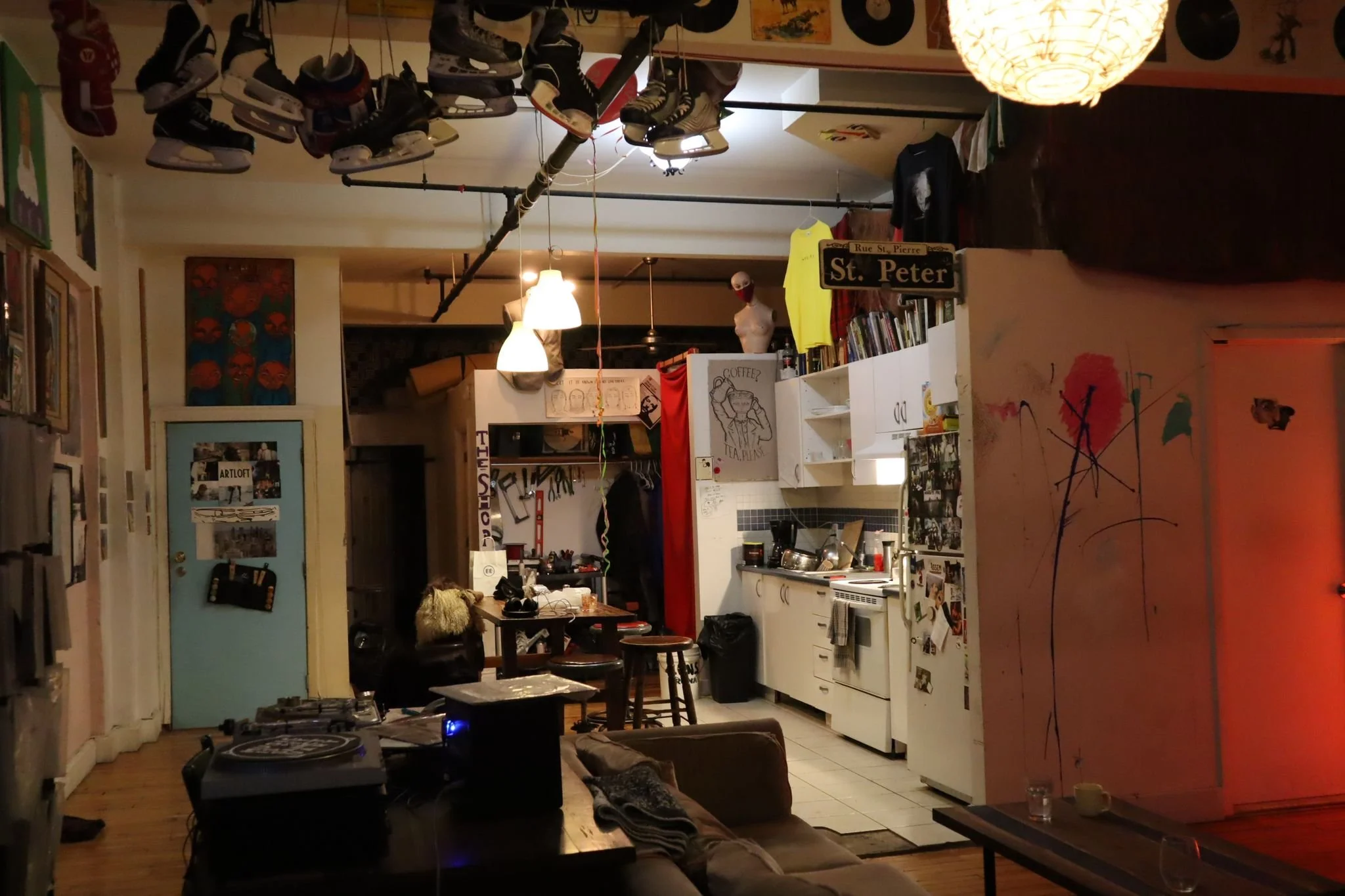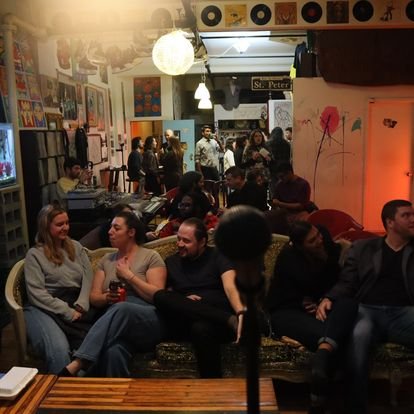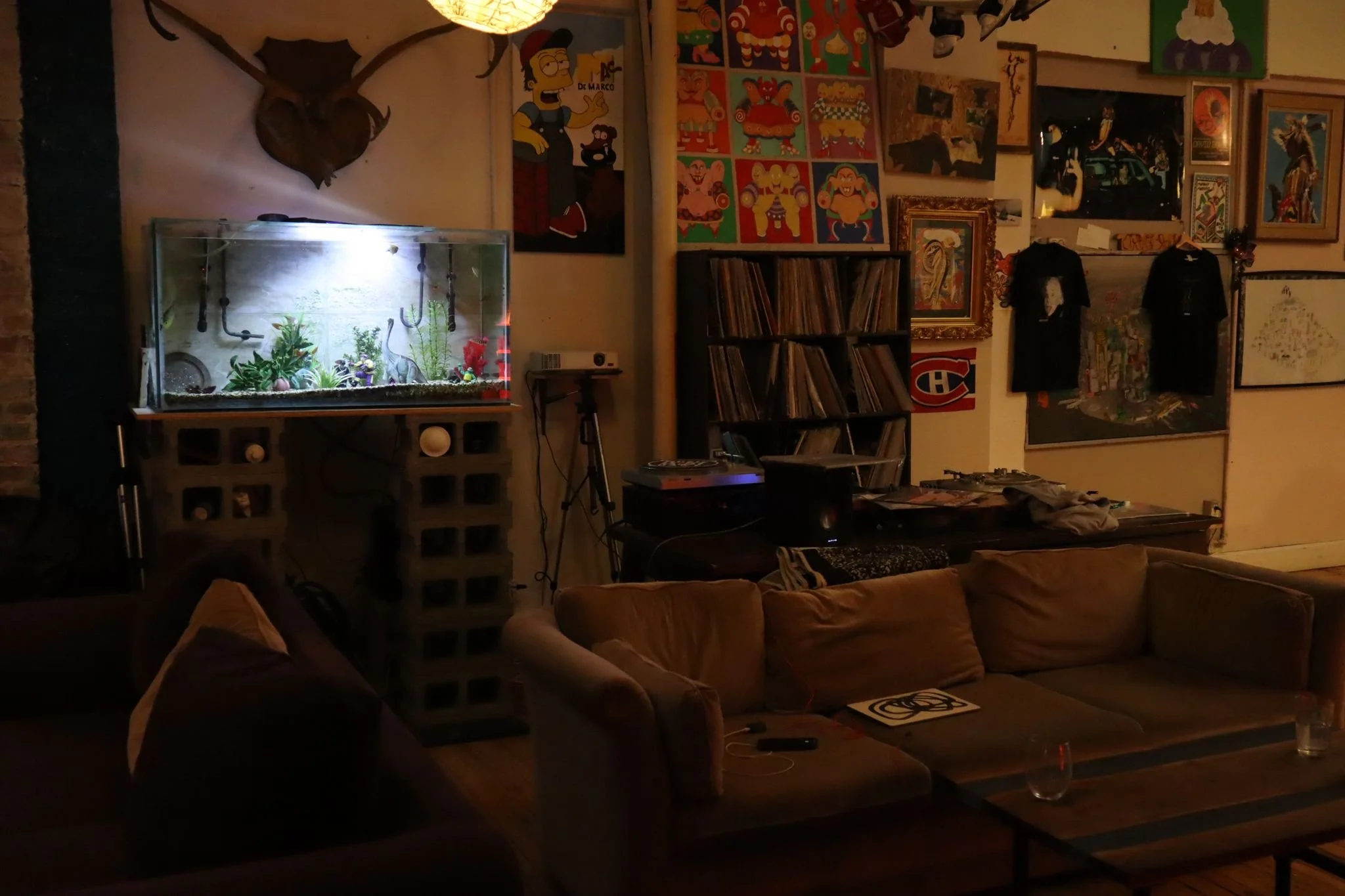The Artloft - MTL Venue Series
To visit The Artloft for the first time is to be initiated into a secret little society—one that would have you transported into a world of passionate presence, creativity and human connection.
Well, that’s the mission statement.
The first time I actually visited the Montreal cult venue was this past summer, making me a very late arrival to the secret destination. It’s a balmy August night, and I’ve just arrived back in Montreal after spending the pandemic in my very small-town home—Middle-of-Nowhere, Cape Breton Island, if you must know. It’s been a quiet pandemic for me, and the idea of being taken to some off-grid, bilingual, punk comedy show in the bowels of a mysterious Plateau edifice is exactly the type of thrill I’m after.
From the street outside, there is no indication that anything of note even exists in this particular corner of the city: a series of tall, unremarkable mid-century buildings cut mutely into the sky at St-Laurent and Rachel, housing in their bottom fifths a row of innocuous ground-floor businesses like furniture stores and pita shops. The façades are clean but not contemporary. It isn’t a particularly pretty part of the long street, much less a thrilling one. No sound issues from strategically-placed speakers to lure you into an establishment; no signs announce where treasure may be hidden. It would be more than easy to walk right by the door of The Artloft in search of a good time further down St-Laurent...and this is exactly what most people do.
If, however, you have the privilege of being guided by a slightly cooler friend (as I did), you may learn that for those in the know, this seemingly unexceptional grey city block is home to one of the Plateau’s most successful hidden venues, best known for its long standing Friday night comedy show. And the secrecy surrounding the place isn’t an accident. For the founders of The Artloft, the furtiveness is self-preservational; their business is an entirely underground one, operating on sheer autonomous gumption in a residential zone, independent of permits, licenses and receipts. There is no paid advertising, no marquee, no arrows on the ground. What you will find at The Artloft, however, are film viewings, concerts, pop-up markets, comedy shows, rental events, even a straight-up rager now and again. This is a space where anything and everything can and does happen, resulting in the not-so-hushed reputation for fun that has been building since the informal enterprise’s conception eight years ago.
The most notable quality of The Artloft, as I will soon find out, is the fact that it blends the concepts of performance space and house party, given that the host, doorman and deejay (and often others) actually live there full-time. It is this simple fact that leads to the venue’s speakeasy-iest quality: simply having the street address—[REDACTED]—isn’t enough to get you inside. There is a buzzer system between you and the first floor interior—a typically drab, fluorescent-lit front lobby, much like that in any other somewhat rundown public edifice in the city. To pass through, you must either message the organizers on Facebook for the code or, like me, show up with someone who already has the intel.
Once inside — up the staircase, through the winding corridor, down a certain decorated hallway and through the heavy door — The Artloft is quite a remarkable thing to behold. Founded on the second floor of a former bank that was chopped up into apartments some years ago, the residential unit boasts extremely high ceilings with exposed industrial detailing, an expansive open-concept shared space and panelled glass partitions that function as walls to separate the inhabitants’ private quarters from the area that opens to the public. The giant living room/kitchen—the part where events are hosted—contains a stage area on one side, rows of mismatched antique sofas, tables obscured in audio equipment and, predictably, tons of art. Mannequins leer down at you from on high. Posters blemished with graffiti and kiss prints look on in the bathroom. Rafts of original art pieces—both beautiful and amateurish—occupy the substantial vertical real estate. Hardly a square foot is left unembellished. If a column of wall is too small for a canvas, it is decorated in paint splatters and Sharpie scribbles. To say the space is stimulating is to leave too much unspoken.
Unknown to me at the time of this first visit is the fact that The Artloft is still very much recovering from COVID restrictions and curfew; the shows are less frequent now and turn-outs smaller. Even still, by the time my friends and I climb the stairs and pay our small entrance fee, the giant main room seems to be packed with people.
Shortly after 10 PM, the room lights go down and we meet our host for the evening: Artloft founder and dweller Quinn McMorrow, a thirty-something professional comedian whose bedroom lies just out of view behind the stage. He warms up the crowd before relinquishing the mic to the first full-set comic, reappearing only in short stints in between other comedians’ sets to tell jokes and amp us all up. The featured comics are hit and miss in terms of funniness, but one thing is undeniable: Quinn McMorrow is a real force. Confident, unflappable and indisputably responsible for the biggest laughs of the night, Quinn’s command over the audience seems surgically precise. After the show, he socializes easily with friends and strangers; a big, Hemingway personality amongst attendees and other comics alike.
I intend to visit The Artloft again soon, and life being what it may be, the next time I return is for the purpose of this feature the following winter. I am scheduled to arrive at 4pm for my conversation with Quinn and show up five minutes early. I press the buzzer for entry. It rings out without an answer. I wait a few minutes before trying again. Still no answer. Three times, four times, no response. I am beginning to consider the possibility that I am being stood up when on the fifth ring, Quinn’s thick voice finally breaks through the speaker with a crackle to let me know the door is being unlocked.
I take the staircase to the second floor and once again follow the small handmade sign on printer paper that points down a dark hallway. As I get closer to Unit [REDACTED], the walls start to fill with drawings and small art pieces; a sure sign that Artloft is just ahead.
When I arrive at the door, Quinn is there to let me in. He’s not quite the gregarious, big-mittened-handshake he was last time I saw him. Pulling a shirt over his head, he informs me that he just woke up and turns away to put a few small things in order as I set up for recording. He puts on coffee. His responses to my first few comments and compliments on his home are low-toned and somewhat clipped.
Turns out there was an event last night, and it ran late, which isn’t unusual. But that’s the lifestyle, and Quinn is glad to be back at it after temporarily shutting down during the pandemic.
“At first, when it was like, you couldn’t do anything, I was actually a little bit relieved. I didn’t realize how burnt out I already was. Because, you know, you’re hosting, running around, getting someone a drink while someone else is asking you where to find a napkin. You’re trying to keep comics happy, you’re trying to keep the artists happy. The logistical stuff...you know, there’s always somebody like, ‘oh, do you have this amp?’ ‘You have to have the DJ play this song!” There are always messages to respond to... So I actually took advantage of the lockdown, not doing anything, not going anywhere. But it went on too long. Eventually I got a little stir crazy to get going again. It got to the point where we were just raring out of the gate. Especially for the comedy show. It helps with rent. That’s the only show where we actually make money. Everything else, we break even. But that’s okay, it’s The Art Loft, not The Cash Loft.”
So how did the venue get started? Quinn rips through the story: he and some friends moved into the space in 2015. They began hosting shows that same year, starting with a schizophrenic mixture of classical music and stand-up. Each roommate contributed to the events with whatever skills they had to offer: deejaying, videography, sound engineering, working the door. The popularity of the events grew and grew. The product became more refined. Years later, The Artloft has become a steady enterprise with events at least once a week, although usually more often.
“I always liked the idea of a crazy house where anything could happen,” says Quinn, “but also it’s a bunch of artists. It would be great if my legacy was that I ran a place where a lot of people did cool things. I’ve always been drawn to creative people. I grew up in a very small town [in Lindsay, Ontario] where there wasn’t a big art scene and still isn’t. It’s more farming towns, lotta trades people. I was torn between those two worlds. But I like being around artists. I like it even if they don’t like me.”
It’s hard to tell the story of Artloft without telling the story of Quinn himself. For better or for worse, he’s at the head of the beast; event coordinator, emcee, visionary and one of the OG roommates. He is obsessed with art, so much that he has fashioned his life around its cultivation. The original seeds for the project—a creativity-focused community performance space where people can share and enjoy each other’s company—were sown around a decade ago on a trip to Amsterdam where Quinn stayed in a hostel that promoted socializing between guests. “The hostel really had an impact on me, you know, to be sitting there with a guy from Albania, a guy from Chile... That kind of energy is interesting to me, that real energy. Everyone, I think, is in some way kind of the best version of themselves when they’re travelling. They can let go of the constraints that they have had in the rest of their lives. I thought: yeah, I want to capture that energy.”
What followed this discovery for Quinn were a few years spread between various Canadian cities wherein his vision of communal living, art creation, non-judgement and intentionality were refined. There were wild parties, grand philosophical ideals, apartment bonfires, some destruction. Stories from this period frequently end with “and we got evicted the next day.” First comes his stint in Halifax in his early twenties where he penned his first live-in-the-present type manifesto, consisting of such edicts as “you can’t check your phone if another person’s in the room,’ or ‘you can’t turn down a stranger’s invitation to do something,” and described by Quinn as “probably cringey.” Then comes the social experiment project in East Van where a group of friends rented a soon-to-be-condemned building and established an interaction- and experience-focused flop house— Quinn’s version of the Amsterdam hostel—through the site CouchSurfing.com. “Initially my plan was this: we get a farm in interior BC somewhere, and artists can come and live there for free. It’s removed from all distractions of society, and the artists can work on their art and we can eat the food from the farm. But then I realized that I had no money and this was impossible. So we got a place in East Van.
“I wouldn’t read anyone’s [CouchSurfing] request. I wouldn’t check out their profile. I just sent a copy and paste response that said ‘yep,’ and gave ‘em the address. The first night we had ten people. We had an attic, so anytime we saw mattresses out on curbs or in alleys, we would drag them in and throw them up there. It could sleep like twenty-five people just in the attic. The most we had one night was 44 people. Nobody knew each other. It was chaos.”
Throughout this time, Quinn got progressively clearer about his ultimate intentions. The sense of fellowship these open dwellings provided was good, but: “I knew I wanted to do something like that again but not the same way. I wanted to do more that was actually art-focused.”
Once the Vancouver house was demolished, Quinn decided to make the move to the city that would become his home for the next eight years and counting: Montreal. With some friends and relatives in tow, he moved into the refurbished bank apartment at [REDACTED] and started hosting events. Initially, it was a pretty informal affair. “It’s crazy when I think of how little we could do for it to be successful in the beginning. For a good three years, we’d all wake up a half hour before people showed up. We didn’t have to do anything aside from getting out of bed.
“But we’ve been doing it for eight years now, and we’re trying to be a bit more professional than we used to be.” And in spite of its intimate setting—the stage shares a half “wall” with two bedrooms, which are across from another loft bedroom above the kitchen, plus two more on the far wall—Artloft does feel like a professional venture. There’s lighting. There’s a PA system. There’s branded merch. The whole thing runs like a well-oiled machine, due entirely to the care and love of its peculiar denizens. But the lack of privacy is not for everyone. “You’d have to have some personal, vested interest in living here because it’s a very abnormal lifestyle, having no walls in a quasi-venue. You’d have to want to do this. Alex [roommate and co-owner #2] does videography and photography, Sam [roommate and co-owner #3] is a musician and he’s getting into screen printing... Everyone's creative. And in a way there are benefits; you meet lots of people here.”
So is the fusion of home and venue an essential part of it? Why not go straight, maybe open a nightclub?
“Primarily I don’t want to deal with the headache of the city—taxes and all that. Also then you open up Pandora's box of unhappy customers, reviews… people having a real expectation. One time I had a girl ask for a wine glass and I was like, ‘I don’t have that.’
“People like it like this, especially now that things have been so sanitized. When I first got here in 2014, I couldn’t believe how many people were doing things like this. It felt like there were no laws. We used to joke about that. ‘Are there no laws in Montreal?’ But all that’s changed in the last ten years. Still a great city. But there are a lot more police in the parks now, they seem to have less to do so they’re around... We’re one of the last places championing that spirit.”
By the end of our conversation, Quinn is animated, lively, his face showing part of the intense presence he promotes. It’s the same energy that enraptured his audience the night of the performance we’d seen in August. One feels that he’s been campaigning all his life for a certain quality of experience through art and connection, and The Artloft is only a very particular expression of that focused intention. It’s a loud life, an exciting one...but for all of its allure, to live eternally in that energy—to wake up the morning after in the same nightclub—seems exhausting.
But after eight years of co-running The Artloft in Montreal, and an even longer time searching for authenticity and meaningful experience, Quinn and the co-hosts aren’t going to bed yet. You can still hit up the weekly “Comedy at the Artloft” event every Friday (and you should), or a Cinema Soirée for a screening of an old film followed by a discussion. Or just keep your ear to the ground for other events hosted at the weird art-world wonderland. At the very least, it’s an excuse to vacation into Quinn’s intense world of right here, right now. Who knows, you may even come away convinced to share in that essential life goal: to capture the ephemeral thrill of the traveller at the hostel—that real energy—and hold it as long or as often as you can.
For more information, check out The Artloft and Comedy At The Artloft on Facebook.
And visit Artloft Media for much more!








